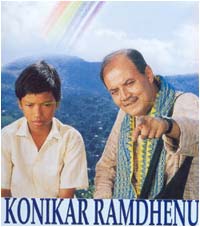Jan 22, 2026
Jan 22, 2026
 Jahnu Barua is arguably the most well-known filmmaker from the North-Eastern part of India. Over the years I have seen many of his works that captures the quintessential essence of Assamese life. The serious cinema movement in Assam that gained prominence in the late seventies/early eighties with the films of Dr. Bhabendranath Saikia found a worthy successor in Jahnu Barua whose films have wowed audiences in prestigious film festivals and brought much acclaim to cinema of the region.
Jahnu Barua is arguably the most well-known filmmaker from the North-Eastern part of India. Over the years I have seen many of his works that captures the quintessential essence of Assamese life. The serious cinema movement in Assam that gained prominence in the late seventies/early eighties with the films of Dr. Bhabendranath Saikia found a worthy successor in Jahnu Barua whose films have wowed audiences in prestigious film festivals and brought much acclaim to cinema of the region.
One of his early films, Apooroopa, bears a striking similarity to Satyajit Ray’s Kaapurush though the endings were different. Holodia Choraye Baodhan Khaye depicts the corruption in the system through the struggle of a peasant’s fight for saving his land from being usurped. Corruption is a running theme in most of his films whether the setting is in the forest (Bonani), education (Firingoti) or a juvenile home (Khonikor Ramdhenu).
Recently I saw Khonikor Ramdhenu. This is a 2002 film directed by Jahnu Barua. In this work I discovered a different JB than in his other films. This film captures the dreams and the aspirations of a small village boy who is forced by circumstances to flee from his home and come to the city for livelihood. An unfortunate incident lands him in a Juvenile Home. The segment in the juvenile home bears a similarity with the award winning Jabbar Patel directed Marathi film UMBARTHA which was based on a Women Reformatory center. The film 'Khonikor Ramdhenu' is embellished by strong performances of veteran actors like Bhishnu Khargoria and Moloya Goswami. BK as a sympathetic Warden of the Juvenile Home is brilliant who develops a deep bond with the small boy Kukoi who is now an inmate. The film has several uplifting elements and a lighter feel than other JB works even though the subject and the message of the film is strong. It is also currently available on Youtube.
02-Nov-2024
More by : Subhajit Ghosh